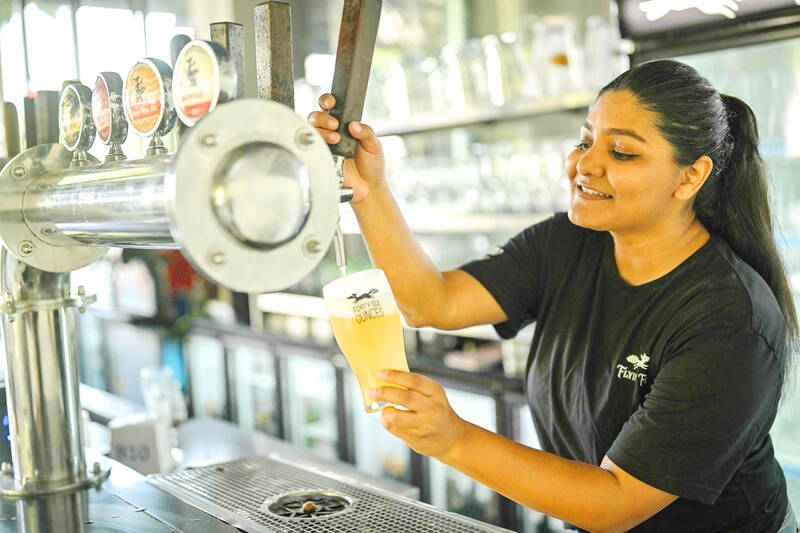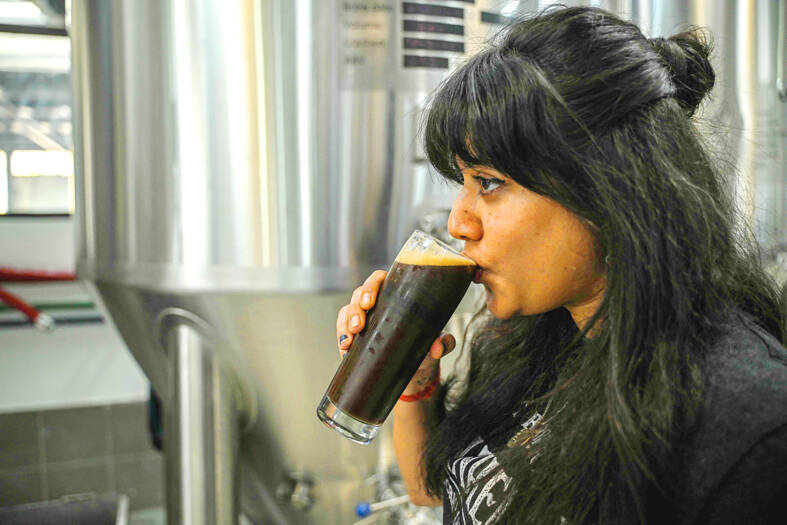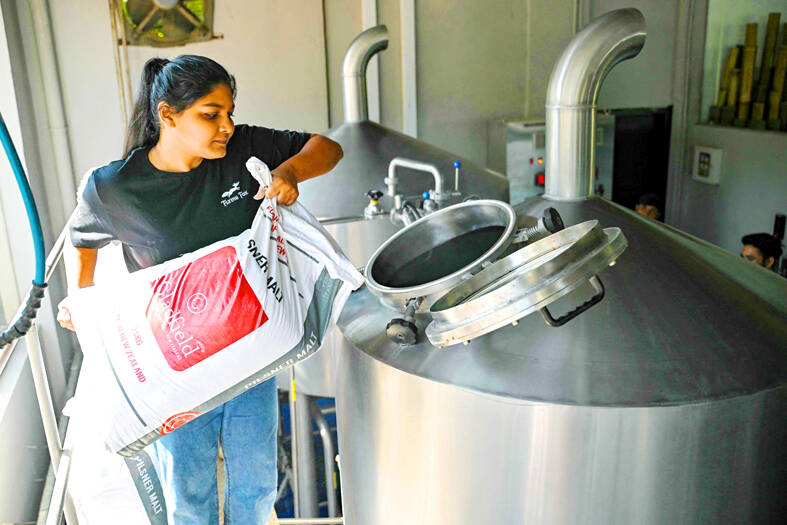As a fixture of India’s burgeoning craft beer scene, Varsha Bhat is a rarity twice over: first as a woman who brews alcohol, and second as a woman who drinks it.
Bhat is staking a claim to a male-dominated industry in a country where social mores compel most women to stay teetotal. The 38-year-old had for years weathered barbs from male peers questioning whether she had the muscles to carry hefty bags of hops or was calm enough to deal with the job’s pressures.
However, after a decade in the industry she has risen to become head brewer at one of Bengaluru’s most popular pubs, catering for the city’s moneyed young tech workers.

Photo: AFP
“There’s nothing a woman can’t do that a man can ... from recipe development, to the physical work, to managing a team,” Bhat said.
“We’ve taken that step to come forward and say that we can do it,” she added. “There was a stigma ... we’re breaking those stereotypes and barriers.”
Bengaluru has long been renowned for a more liberal drinking culture than the rest of India — a country where 99 percent of women do not drink, government figures showed.

Photo: AFP
Its signature technology industry employs a young and highly educated workforce drawn from elite universities, often arriving without established social connections to the city.
That provides a roaring trade to Bengaluru’s thriving craft beer bars, with in-house breweries employing hundreds and a clientele eager to meet new people and ready to burn money.
The city’s workforce is an anomaly in a country where only 25 percent of working-age women are formally employed, official statistics showed.

Photo: AFP
By comparison, they account for nearly 40 percent of those working at Bengaluru’s tech firms — a testament to the city’s ability to draw ambitious women from elsewhere in India, large numbers of whom are seen chatting raucously with friends in bars after hours.
Among them is Lynette Pires, 32, who moved to Bengaluru to work as a pharmaceutical researcher, but quickly found herself drawn to the brewing business.
Her path to becoming the brewer at a burgeoning outdoor beer garden in the city’s south forced her to assert herself over male colleagues who refused to take her seriously.
“Standing there in mostly a male-dominated room and trying to get your opinion across or trying to get them to listen ... you have to learn how to overcome that and move past it,” she said.
Four years ago she founded the Women Brewers Collective, which, along with more than a dozen other women working in the city’s brewpubs, aims to smooth the path for those who come next.
“I definitely want to be a role model for other women brewers,” Pires said. “That’s what it’s all about — to inspire and help develop other women who are entering the industry.”
While Bhat and Pires are trailblazers in their own city, women have been the pillars of the brewing industry since ancient times.
The first recorded beer recipe is thought to have been written on a piece of clay in 1800 BC as an ode to Ninkasi, the Sumerian goddess of beer.
Around the same time in Mesopotamia, the Code of Hammurabi, among the earliest known laws, referred to female tavern owners.
Given that history, it was “crazy and a little immature and ignorant when people say it’s a man’s drink,” said Girija Chatty, host of a podcast about India’s beer industry.
Drinking is often frowned upon in India, with independence leader Mahatma Gandhi one of the most strident voices in favor of temperance and abolition.
India’s 1949 constitution enjoins the government to ban drinking except for “medicinal purposes,” a clause largely ignored except for prohibitions imposed in some states.
Even among the small minority of Indians who do drink, the divide between the sexes is stark — nearly 15 times as many men as women imbibe, a government health survey published in 2022 showed.
Among the small number of women who frequent bars, that divide and its attendant social expectations are still easy to spot. Chatty cites the regular instance of waiters reflexively handing the drinks menu to any man seated at the table — rather than the woman who asked for it in the first place.
“If women can handle bitter men, they can very well handle bitter beer,” she joked.

‘SWASTICAR’: Tesla CEO Elon Musk’s close association with Donald Trump has prompted opponents to brand him a ‘Nazi’ and resulted in a dramatic drop in sales Demonstrators descended on Tesla Inc dealerships across the US, and in Europe and Canada on Saturday to protest company chief Elon Musk, who has amassed extraordinary power as a top adviser to US President Donald Trump. Waving signs with messages such as “Musk is stealing our money” and “Reclaim our country,” the protests largely took place peacefully following fiery episodes of vandalism on Tesla vehicles, dealerships and other facilities in recent weeks that US officials have denounced as terrorism. Hundreds rallied on Saturday outside the Tesla dealership in Manhattan. Some blasted Musk, the world’s richest man, while others demanded the shuttering of his

ADVERSARIES: The new list includes 11 entities in China and one in Taiwan, which is a local branch of Chinese cloud computing firm Inspur Group The US added dozens of entities to a trade blacklist on Tuesday, the US Department of Commerce said, in part to disrupt Beijing’s artificial intelligence (AI) and advanced computing capabilities. The action affects 80 entities from countries including China, the United Arab Emirates and Iran, with the commerce department citing their “activities contrary to US national security and foreign policy.” Those added to the “entity list” are restricted from obtaining US items and technologies without government authorization. “We will not allow adversaries to exploit American technology to bolster their own militaries and threaten American lives,” US Secretary of Commerce Howard Lutnick said. The entities

Minister of Finance Chuang Tsui-yun (莊翠雲) yesterday told lawmakers that she “would not speculate,” but a “response plan” has been prepared in case Taiwan is targeted by US President Donald Trump’s reciprocal tariffs, which are to be announced on Wednesday next week. The Trump administration, including US Secretary of the Treasury Scott Bessent, has said that much of the proposed reciprocal tariffs would focus on the 15 countries that have the highest trade surpluses with the US. Bessent has referred to those countries as the “dirty 15,” but has not named them. Last year, Taiwan’s US$73.9 billion trade surplus with the US

Prices of gasoline and diesel products at domestic gas stations are to fall NT$0.2 and NT$0.1 per liter respectively this week, even though international crude oil prices rose last week, CPC Corp, Taiwan (台灣中油) and Formosa Petrochemical Corp (台塑石化) said yesterday. International crude oil prices continued rising last week, as the US Energy Information Administration reported a larger-than-expected drop in US commercial crude oil inventories, CPC said in a statement. Based on the company’s floating oil price formula, the cost of crude oil rose 2.38 percent last week from a week earlier, it said. News that US President Donald Trump plans a “secondary